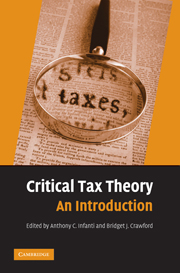Book contents
- Frontmatter
- Contents
- List of Illustrations
- List of Tables
- List of Contributors
- List of Common Abbreviations
- Introduction
- CHAPTER 1 FOUNDATIONS OF CRITICAL TAX THEORY
- CHAPTER 2 HISTORICAL PERSPECTIVES ON TAXATION
- CHAPTER 3 THE GOALS OF TAX POLICY
- CHAPTER 4 CRITICAL TAX THEORY MEETS PRACTICE
- CHAPTER 5 RACE AND TAXATION
- Tax Counts: Bringing Money-Law to LatCrit
- A Black Critique of the Internal Revenue Code
- The Marriage Bonus/Penalty in Black and White
- Tax and Race: The Impact on Asian Americans
- Race and Equality Across the Law School Curriculum: The Law of Tax Exemption
- Race and Class Matters in Tax Policy
- CHAPTER 6 GENDER AND TAXATION
- CHAPTER 7 SEXUAL ORIENTATION AND TAXATION
- CHAPTER 8 THE FAMILY AND TAXATION
- CHAPTER 9 CLASS AND TAXATION
- CHAPTER 10 DISABILITY AND TAXATION
- CHAPTER 11 GLOBAL CRITICAL PERSPECTIVES ON TAXATION
- CHAPTER 12 CRITICAL PERSPECTIVES ON CRITICAL TAX THEORY
- Index
Race and Class Matters in Tax Policy
Published online by Cambridge University Press: 04 August 2010
- Frontmatter
- Contents
- List of Illustrations
- List of Tables
- List of Contributors
- List of Common Abbreviations
- Introduction
- CHAPTER 1 FOUNDATIONS OF CRITICAL TAX THEORY
- CHAPTER 2 HISTORICAL PERSPECTIVES ON TAXATION
- CHAPTER 3 THE GOALS OF TAX POLICY
- CHAPTER 4 CRITICAL TAX THEORY MEETS PRACTICE
- CHAPTER 5 RACE AND TAXATION
- Tax Counts: Bringing Money-Law to LatCrit
- A Black Critique of the Internal Revenue Code
- The Marriage Bonus/Penalty in Black and White
- Tax and Race: The Impact on Asian Americans
- Race and Equality Across the Law School Curriculum: The Law of Tax Exemption
- Race and Class Matters in Tax Policy
- CHAPTER 6 GENDER AND TAXATION
- CHAPTER 7 SEXUAL ORIENTATION AND TAXATION
- CHAPTER 8 THE FAMILY AND TAXATION
- CHAPTER 9 CLASS AND TAXATION
- CHAPTER 10 DISABILITY AND TAXATION
- CHAPTER 11 GLOBAL CRITICAL PERSPECTIVES ON TAXATION
- CHAPTER 12 CRITICAL PERSPECTIVES ON CRITICAL TAX THEORY
- Index
Summary
As President Bush recently acknowledged, Hurricane Katrina made visible the race and class divide in America. Many questions have been raised in the wake of this tragedy, and hopefully those questions will spark vigorous debates regarding racism and poverty in our country. One question that should be asked, but has rarely been, is what role does tax policy play in creating or exacerbating America's racial and class divide? As President Bush stated earlier this month, albeit in a very different context, “tax policy matters.”
Low-income taxpayers are under attack. We recently learned that for the past five years, hundreds of thousands of low-income taxpayers have had their refunds frozen and labeled fraudulent, although almost two-thirds appear to have done nothing wrong. Beginning in 2004, the IRS now requires additional records [to] be submitted in addition to tax returns before 25,000 low-income taxpayers receive their refund. Low-income taxpayers are more likely to be audited than any other taxpayer group. Since 1998, the IRS has spent over §1 billion on audits of low-income taxpayer returns. No other taxpayers are subject to such scrutiny.
Each year 5,000,000 families are lifted out of poverty because they receive the low-income taxpayer credit. More children are lifted out of poverty as a result of the credit than any other governmental program.
Tax scholars who have recently written about low-income taxpayers often either ignore these facts, or assume they are the price to be paid for tax benefits for low-income taxpayers. Politicians routinely demonize low-income taxpayers by decrying all the “fraud” associated with the low-income tax credit.
Politicians are correct to a certain extent. There are errors associated with tax returns of low-income taxpayers.
- Type
- Chapter
- Information
- Critical Tax TheoryAn Introduction, pp. 144 - 152Publisher: Cambridge University PressPrint publication year: 2009
- 1
- Cited by



